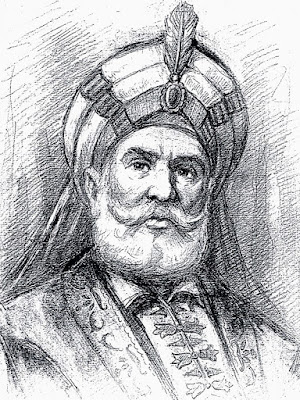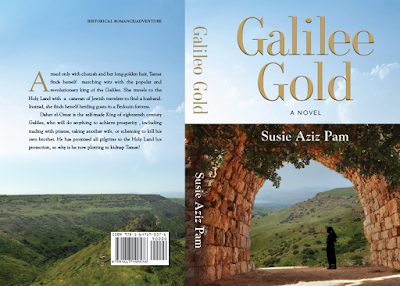Galilee
Gold is the kind of book you can’t put down. I started reading the
book on a Friday night after supper, read late into the night, picked up where
I’d left off the next morning, and had read the entire book—cover to cover—by
11 AM, just in time to sit down for Sabbath lunch. Not bad for this first effort—a
novel that is part historical fiction, part romance—from author Susie Aziz Pam.
The story outlined in Galilee Gold takes place in the 18th
century and is based on the life of Daher el-Omar, a powerful figure of the
time. El-Omar was a self-proclaimed Bedouin king who encouraged Jewish
settlement in the Galilee. In Pam’s skillful hands, el-Omar’s tolerance for the
Jews leads to romance when el Omar falls hard for the niece of a Syrian Jewish
family under his protection.
The Jewish heroine of the book, Tamar,
is of course, beautiful, with a fiery nature and golden hair. It’s no wonder that
el-Omar is smitten, though I admit I was discomfited by the concept of a
Bedouin-Jewish romance—especially since this is fiction: it never actually happened.
That being the case, why imagine a
romance between a Jewish woman and a Bedouin king? Because it makes for darned
good reading, even if I didn’t like the concept in theory. And make no mistake:
I devoured this book and hope that Galilee
Gold is only the first of many books to come from the pen of Susie Aziz
Pam.
I spoke to Susie Pam to learn more:
Varda
Epstein: Can you tell us a bit about your upbringing, your family, and how and
when you came to make Aliyah?
Susie Aziz Pam
Susie Pam: My family were kind of
nomads. Both my parents were Persian Jews, from the Mesh'adi community.
Mesh'adi Jews were known for keeping the mitzvoth inside their homes, while
practicing Islam on the outside—but that is the subject of my next book.
My father's family lived in the Bukharan
Quarter in Jerusalem, where their house stands to this day. My mother's family
lived in London. After seeking their fortune in London, New York, South Africa,
and New York again, my parents settled in Kew Gardens, Queens. We are a very
Zionistic family and all of my father's family remained in Israel. So a few
years after the Six Day War, in the wave of pro-Israel sentiment, my parents
moved to Jerusalem, giving me just enough time to finish high school in New
York.
 |
| 1925 photo of the ancestral Aziz home in the Bukharan Quarter of Jerusalem |
Varda
Epstein: Can you talk about how you came to write this story? How did you come
to hear about Daher el-Omar? Why did this story beckon to you?
Susie Pam: We
first met Daher el-Omar when we visited the Yehiam
Fortress. The little I found out about el-Omar then, made him stand out
like a Disney character: he traded with pirates, he fought off the Ottomans, and
he crowned himself the King of the Galilee. But after I began to read up on
him, I discovered an amazing fact—el-Omar invited the Jewish communities from
Turkey and Syria to settle in the Holy Land. "Return and inherit the land
of your forefathers!"
 |
| Yehiam Fortress |
 |
| Inside Yehiam Fortress |
Varda
Epstein: Who was el-Omar? What was he like?
Susie Pam: Daher el-Omar was
the son of the local tax-collector in the Galilee. His vision of Moslems,
Christians, and Jews living together and prospering in the eighteenth century,
made him a very tolerant and pluralistic leader.
Varda
Epstein: Is there any evidence that el-Omar had a romance with a Jewish woman
or took a Jewish wife?
Susie Pam: Not to my knowledge. He had
many wives and many sons. I only deal with two of his wives in my novel. At the
very end of his life, when he was in his 80's, he had a young wife from Russia,
who was blond and blue eyed. Legend has it, that the Ottomans attacked Acco (Acre) and
he went back to save this wife, and he was killed. But I do not cover that part
of his life in my book.
 |
| Susie with her two daughters, this past summer. The author also has two sons. |
Varda
Epstein: How long did it take you to write Galilee Gold, your first novel?
Susie Pam: Well, when I first started
I had brown hair and now it’s gray! It took me a good many years—mainly because
I wrote most of the chapters in my writing group in Jerusalem, and we only met
once a week! Also, when I started writing, there was not a lot of available information
about that period—now there is a lot more.
 |
| The whole Pam family (see what I did there?) |
Varda
Epstein: Can you tell us about some of the research involved in writing this
work of historical fiction?
Susie Pam: Let's just say that over
the last few years, I sent a lot of $5 donations to Wikipedia. My husband is a tour
guide and he had a few books in which el-Omar is mentioned. I wrote about
herbalism during that period, so I had to read up on plants and their uses, and
which were available in the Middle East. My daughter studied herbalism, so I
was also able to ask her questions. When I reached a point where I had a lot of
questions, we went back up to the Galilee and I found a tour guide whose
specialty is Daher el-Omar.
We arranged to meet Sharif Sharif, a
heritage and conservation expert of Nazareth. He introduced us to Ziad Daher
Zaydany—an architect and artist who drew a portrait of el-Omar and is one of
his many descendants. Of course, I imagined him a little more handsome and
dashing in his younger days than he appears in the portrait.
 |
| Daher el-Omar portrait painted by Ziad Zaydany in 1990 |
Varda
Epstein: Without giving away too much in the way of spoilers, your fictional
Jewish heroine Tamar, is depicted as el-Omar’s captive. Do you think it likely
that if the story had been true, the Jewish community would have made an effort
to ransom and reclaim her? How important is the concept of ransoming a captive
in Jewish law?
Susie Pam: Traditionally, ransoming a
captive is a very important concept, even today—and I believe the Jews of
Aleppo would have made an effort to raise the funds needed to rescue Tamar, had
it been feasible.
Varda
Epstein: What’s next up for Susie Pam?
Susie Pam: I have another three books
in the works—at different stages of completion. Two are historical fiction, and
one is a story about an American girl who volunteers on a kibbutz—a traditional
kibbutz from the old days—and decides to stay.
***
Galilee
Gold is currently available at Booklocker and Amazon.


